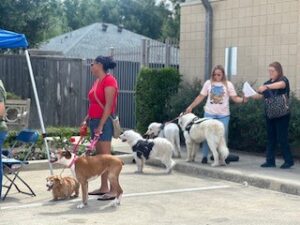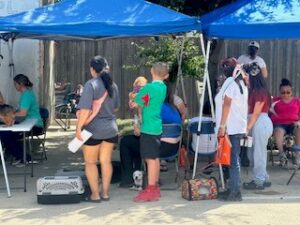January is Human Trafficking Prevention Month: Part 2 By: Justice Venture International [As we start the new…
Veterinary Services That Change Communities
By Lynn Gibson, Senior Program Officer
On August 30th, while most of us were still sleeping in that Saturday, dozens of our neighbors in West and South Dallas started lining up as early as 5:00 am outside of Brother Bill’s Helping Hand. They were queueing up in order to receive low-cost or donated spay-neuter services and vaccines for their beloved pets. This opportunity was made possible by The Bissell Pet Foundation, veterinary teams from The No Strays Project in Reklaw, Texas, Spay-Neuter Network, the SPCA of Texas, Brother Bill’s Helping Hand, and funding from The Rees-Jones Foundation.
Brother Bill’s hosted and promoted the event to neighbors in ten of the zip codes that they serve. The No Strays Project provided the medical units, teams, and expertise and worked to check in neighbors and their pets while providing them with the information and resources needed post-treatment. Spay-Neuter Network ran three educational sessions emphasizing the importance of spaying and neutering dogs (especially) as a way to help public safety and to prevent strays and packs of dogs on the streets of Dallas. SPCA of Texas provided treats and toys for both dogs and cats.
All of this teamwork was showcased in an event where 100 family pets – 46 dogs and 54 cats – received low-cost spay-neuter services and 78 dogs and 18 cats received vaccinations. Initiatives like these not only protect family pets, but impact the broader animal population and humans. More than 20 residents attended the Spay-Neuter Network educational sessions, gaining important knowledge and leaving with materials on animal care and veterinary services for their dogs and cats.
“We understand that, for many of our neighbors, pets are family,” says Maria Tovar, Social Services Director at Brother Bill’s “At Brother Bill’s, we aim to support our families in every way  possible, and this includes ensuring their furry loved ones are well cared for. The services offered through this initiative may not have been accessible to many in our community otherwise, and we are deeply grateful to the amazing organizations that made it all possible.”
possible, and this includes ensuring their furry loved ones are well cared for. The services offered through this initiative may not have been accessible to many in our community otherwise, and we are deeply grateful to the amazing organizations that made it all possible.”
One family brought in seven dogs, many others brought in two, three, or four dogs and/or cats so their family pets could get receive full care they needed. For some of those who came to have their dogs or cats spayed or neutered, better health for their pets and a desire to prevent unwanted litters were key factors.
It was clear from the immediate and overwhelming response from the initial outreach that services like this are in high demand. The Rees-Jones Foundation hopes to see more spay/neuter events held like this around the city, in areas where veterinary services are non-existent or unattainable due to cost. The Foundation remains grateful to neighbors and partners who join us in promoting the ethical and humane treatment of companion animals across North Texas.
Share this post:
Category: Original ContentUncategorized
January is Human Trafficking Prevention Month: Part 1 By Shellie Velasco, Program Officer [As we start the…
Welcome to 2025 By Adrian Cook, Director of Research & Evaluation “But the steadfast love of the…

